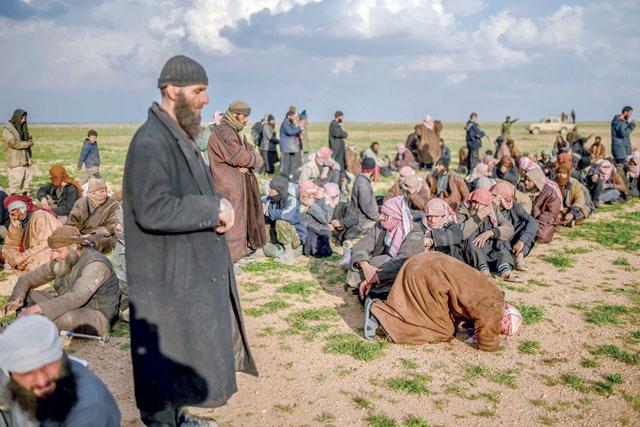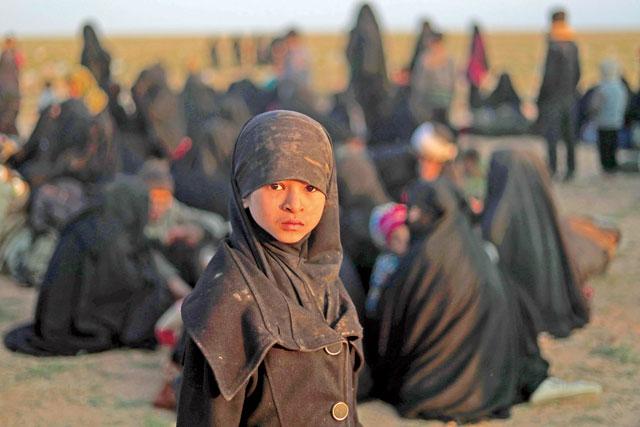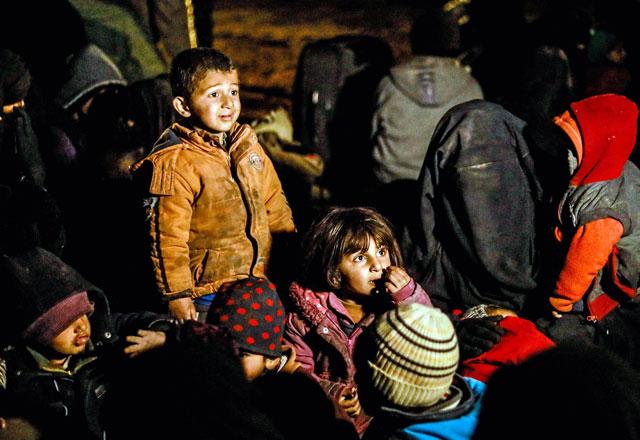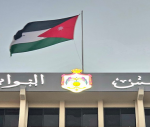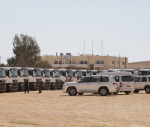You are here
Syria force to pluck more civilians from last Daesh pocket
By AFP - Feb 23,2019 - Last updated at Feb 23,2019
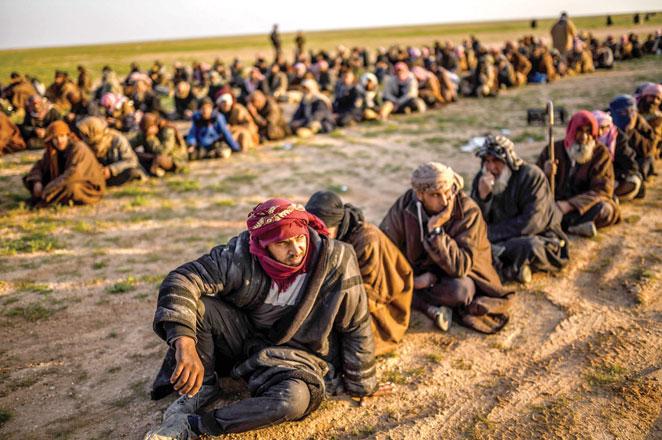
Men suspected of being Daesh fightrs wait to be searched by members of the Kurdish-led Syrian Democratic Forces after leaving the Daesh group's last holdout of Baghouz in Syria's northern Deir Ezzor province, on Friday (AFP photo)
OMAR OIL FIELD, Syria — US-backed fighters said Saturday they are keeping a corridor open to rescue remaining civilians from the Daesh group's last speck of territory in Syria, as the UN appealed for urgent assistance.
The Kurdish-led Syrian Democratic Forces (SDF) have evacuated nearly 5,000 men, women and children from the terrorist holdout since Wednesday, bringing the SDF closer to retaking the less than half a square kilometre still under Daesh control.
"On our side, the corridor is open and we hope a larger number of civilians will arrive but that depends on IS [Daesh] fighters and whether they will give civilians a chance to exit," SDF spokesman Adnan Afrin told AFP at their Al Omar base.
He said the SDF had evacuated "more than 2,000 people, including women, children and men" on Friday, mostly wives and children of Daesh fighters.
Nearly 2,500 people arrived the same day at a Kurdish-run camp for the displaced further north, compounding dire conditions inside the already crammed settlement, the UN's humanitarian coordination office OCHA said.
It warned of the "huge challenges" posed by the influx.
More than four years after Daesh overran large parts of Syria and neighbouring Iraq and declared a "caliphate", they have lost all but a tiny patch in the village of Baghouz near the Iraqi border.
Some 2,000 people are believed to remain inside Baghouz, according to the SDF.
The force says it is trying to evacuate remaining civilians through a corridor before pressing on with a battle to crush the extremists unless holdout fighters surrender.
'No victory'
The SDF transferred the fresh batch of evacuees to a screening point outside Baghouz on Friday, to weed out potential militants.
An AFP corespondent saw hundreds of women and children spread out on the arid desert ground, surrounded by bags, begging for food and water.
A smaller group of men were separated from the women as SDF fighters searched the latest arrivals and checked their identification cards.
An Iraqi woman in her forties wearing a face veil held in her hand a medical report in English.
She said the report was written for her by a doctor inside the Baghouz pocket, explaining that she needed treatment for kidney problems.
Syrian woman Khadija Ali Mohammad, the 24-year-old wife of a deceased Daesh fighter, said conditions inside the Daesh pocket were deplorable.
“We were living in tents and eating bread made from bran. My three sisters and I didn’t have enough money to pay smugglers to get us out before, and our husbands had died in battle” the woman from Aleppo’s countryside in northern Syria told AFP.
She was disappointed at the collapse of the Daesh proto-state.
“God had promised us a caliphate and we went to it,” she said. “I feel there will be no victory although they [extremists] tell us victory is near.”
‘Huge challenges’
Around 44,000 people — mostly civilians — have streamed out of Daesh’s shrinking territory since early December, according to the Britain-based Syrian Observatory for Human Rights.
While civilians are trucked north to Kurdish-run camps for the displaced, mainly to Al Hol, six hours drive from Baghouz, suspected militants are sent to SDF-controlled detention centres.
OCHA said 18 of the 2,500 latest arrivals in Al Hol, mostly women and children, were in “critical condition”.
“Thousands more are expected in coming hours/days at Al Hol camp, putting a further strain on basic services,” it Tweeted.
“This sudden influx presents huge challenges to the response — additional tents, non-food items, water & sanitation and health supplies are urgently needed.”
The International Rescue Committee on Friday said 69 people, mostly children, had died on the way to Al Hol, now home to more than 40,000 of the displaced, or shortly after arriving in past weeks.
“Two thirds of the deaths are of babies under one-year-old,” the relief group said.
The SDF says it has limited resources to administer camps and has called for support from the international community.
Related Articles
OMAR OIL FIELD, Syria — US-backed Syrian forces warned Sunday they were struggling to cope with an outpouring of foreigners from the Daesh g
NEAR BAGHOUZ, Syria — US-backed forces evacuated over 40 truckloads of people from the Daesh group's last Syria redoubt on Monday, as they s
NEAR BAGHOUZ, Syria — US-backed forces in eastern Syria on Tuesday screened and treated truckloads of suspected extremists and relatives who


